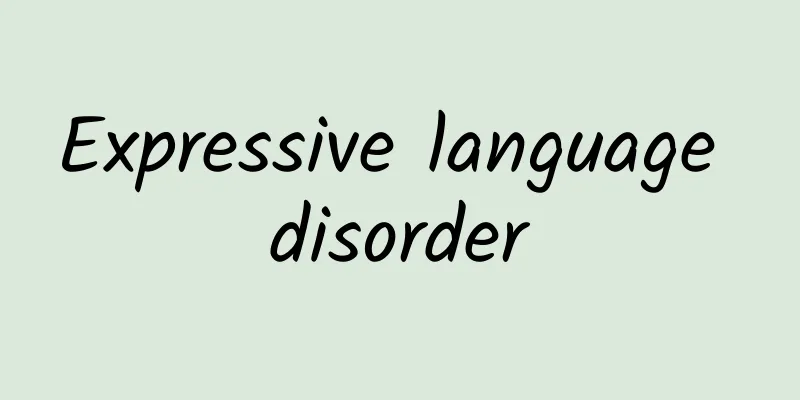Expressive language disorder

|
Expressive language disorder is mainly seen in children and is a type of developmental language disorder. The child has normal intelligence and normal language comprehension ability, but abnormal pronunciation. The disease is mainly caused by developmental delay and is not caused by lesions of the central nervous system or other organs. There are international standards for diagnosing the disease. Treatment of expressive language disorders is generally through language training. Developmental language disorder refers to language disorder caused by developmental delay, rather than hearing impairment, organic damage to the central nervous system, and severe mental retardation. Developmental language disorders are divided into two types: expressive language disorders and receptive language disorders. Expressive language disorder refers to a specific language development disorder in which the child's expressive oral language ability is significantly lower than the level expected for his or her intellectual age, but language comprehension is within the normal range and pronunciation abnormalities may or may not be present. Expressive language disorder refers to a specific language development disorder in which the child's expressive oral language ability is significantly lower than the level expected for his or her intellectual age, but language comprehension is within the normal range and pronunciation abnormalities may or may not be present. Expressive language disorder is a classification of developmental language disorder, which refers to language disorders caused by developmental delays rather than hearing impairment, organic damage to the central nervous system, and severe mental retardation. Developmental language disorders are divided into two types: expressive language disorders and receptive language disorders. CCMD-3 diagnostic criteria for expressive language disorder (1) The child’s verbal expression ability is significantly lower than his or her actual age. He could not speak words at the age of 2 and could not speak two-word sentences at the age of 3. When he was a little older, he still had a small vocabulary, spoke too short sentences, and made grammatical errors. The severity of his speech exceeded the variation range of children of the same age. (2) The ability to understand language is normal. (3) The total IQ of standardized tests is normal (Wechsler Intelligence Test for Children, performance IQ and total IQ ≥ 70). (4) Not due to hearing impairment, oral disease, neurological disease, mental retardation, or pervasive developmental disorder. Differential diagnosis of expressive language disorders 1. Mental retardation The main feature of this disease is low intelligence and a significant reduction in operational IQ. 2. Deaf-muteness In the early stages, the disease manifests itself as an inability to hear any sound and learn to speak, resulting in deafness and muteness, which can be confirmed by a hearing test. 3. Infant autism The children have little language, difficulty expressing themselves or speak unfamiliar words that are difficult to understand. However, children with autism often have obvious mental symptoms, such as being withdrawn, lacking interest in the surrounding environment, not communicating with others through eye contact, having stereotyped ritualistic behaviors, and having intrinsic language loss. It should also be differentiated from selective mutism and developmental dysphasia. Expressive language disorder therapy It mainly involves special language training and no drug treatment is required. The prognosis for people with expressive language disorders is generally good, and they can gradually acquire language skills as they age without treatment. The key is to train the child to imitate other people's speech, and it is best for parents to participate in the training as well. People with receptive language disorders generally have poor language skills. Children with mild symptoms recover better after special training; children with severe symptoms have poorer results, and those with severe symptoms who are also accompanied by hearing loss are almost impossible to cure. The training focuses on language comprehension, auditory memory and auditory perception. |
<<: Can vertebral pain cause fever?
>>: Tips for treating viral fever
Recommend
What causes low sperm count?
There are many reasons for low sperm count. Gener...
Tips for a healthy stomach
Because I didn't pay attention to my eating h...
Precautions for gastric tube insertion
Gastric tube is a way of eating. Some people who ...
Thyroid microsomal antibodies
I don’t know if you know what thyroid microsomal ...
What should I do if my menstruation continues for more than ten days?
In daily life, irregular menstruation is a common...
The harm of drinking Panax notoginseng flower soaked in water
As a precious Chinese herbal medicine, Panax noto...
9-year-old girl has breast pain
A nine-year-old girl may have her period, which m...
If you break your nose, you can apply green ointment
The nose is a very sensitive area. Many people of...
Symptoms of a centipede bite
Centipede is a reptile and also belongs to the in...
The toothache will go away after bleeding.
When you have a toothache, do you try many method...
Eyes dry, tearful, sore, swollen, blurry
Nowadays, people are almost inseparable from mobi...
Corn porridge, five ways to make you love it more and more
In daily life, various kinds of food are actually...
Can a cervical cyst cause bleeding?
Cervical cyst is a gynecological disease with a r...
What are the foods that regulate the spleen and stomach? These four foods can be eaten regularly
Poor spleen and stomach often make people unable ...
Causes of stroke
Stroke is a general term for acute brain diseases...









